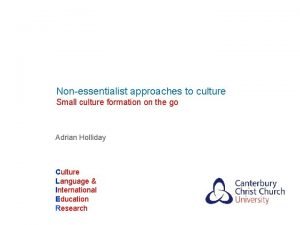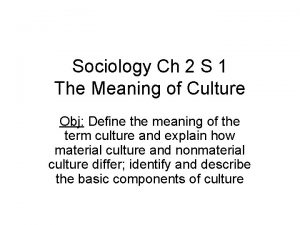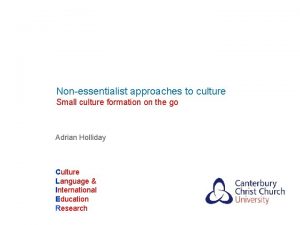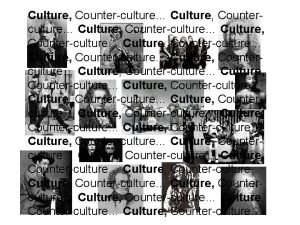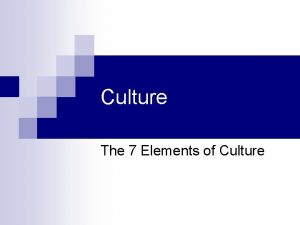Nonessentialist approaches to culture Small culture formation on








- Slides: 8

Non-essentialist approaches to culture Small culture formation on the go Adrian Holliday Culture Language & International Education Research

Original small culture idea o Curriculum intervention – Textbooks in Indian universities (Holliday 1999: 257 -8) – Now re-inspired by SHARMED (Baraldi & Iervese 2017) – People of different types and backgrounds trying to make something work o Inadequate and neo-racist essentialist ‘intercultural’ explanations – Methodological nationalism (e. g. Beck & Sznaider 2006) – Imagined deficiency of the cultural Other – deep Orientalism – West as steward discourse (Edward Said 1978; Holliday 2018) – ‘Us’ and ‘them’ o Small culture analysis – ‘Multiculturality’ of interacting, ‘intertwining’, groups, discourses, etc. (classrooms, institutions, professional groups, structures, interests) • Some ‘from nearby’, some ‘from far’ – Not a normative ‘community of practice’ (Wenger 2000)

Operational and heuristic o Always remembering that ‘our events’ are imposing our constructions on who people are – Small cultures are both real and unreal (1999: 255)

Developing a creative, uncertain ‘grammar of culture’ National and other structures Cultural resources Essentialist, Centre, ‘us’-‘them’ grand narratives Small culture formation on the go Everyone’s everyday engagement with the intercultural Personal trajectories Interculturality Blocks and threads Cultural artefacts and products Creative flows Essentialist discourses of culture De. Centred personal narratives Uncomfortable 3 rd space

Implications o Max Weber – we are always in potential dialogue with structures – Choices and autonomy – Facilitated or stopped by structures o Small culture formation on the go – Coming, going, staying, leaving, agreement, conflict – Process rather than place – Personal cultural trajectories back and forth across time o The teacher-researcher as facilitator – But also caught in the same narratives and discourses – The same choices between blocks and threads (Amadasi & Holliday 2018) – Also deeply implicated – Must interrogate our choices and search for de. Centred 3 rd spaces (Holliday & Amadasi forthcoming) – The cultural and the intercultural merge • We are all hybrid (Bhabha 1994: 56)

The struggle for de. Centred, 3 rd space threads o De. Centredness – ‘The most profound cultural revolution … the margins coming into representation’ – ‘Marginality … is a space of weak power’ – ‘Recovering … hidden mysteries … to retell the story from the bottom up’ (Stuart Hall 1991: 34 -35) o The Centre – Discourse power that defines the Other (Hannerz 1991) • Many Centres – e. g. the West, patriarchy everywhere o 3 rd space as struggle – Searching, recovering, deep reflexivity • Photographs and other devices – Interculturality as digging deeply and uncertainly beneath political structures (Dervin 2016) – Not in-between large cultures

Everyday scenarios • Essentialist blocks: • Exian having a very loud phone conversation on a Bexian train • De. Centred 3 rd space threads: – Excavate own ‘well-wishing’ patronage and lingering patriarchy wherever ‘we’ go – Tolerate that collectivist Exians can’t …. • Travel, meetings, relationships – ‘She should learn that “we” respect personal space’ – Remember what it’s like to have space invaded by anyone – Excuse her because of her culture • Siblings, parents, colleagues, neighbours • She might be not wellsocialised, only mixing with her own ‘culture’, isolated, culturally confused – Excavate own de. Centred influences • Family, school, travel, stories – Investigate the sources of prejudice – Patronising, cultural relativism • False generalisations from events, images, reported histories, media, children’s books, schooling, neighbours – She’s just another anti-social person • ‘Culture’ isn’t an excuse! • The intervention is first with the Self (as educator, researcher, just person)

– Amadasi & Holliday (2018). ‘I already have a culture. ’ Negotiating competing grand personal narratives in interview conversations with new study abroad arrivals. Language & Intercultural Communication, 18/12, 241 -256. – Baraldi & Iervese (2017). Narratives of memories and dialogue in multicultural classrooms: Analysis of workshops based on the use of photography. Narrative Inquiry, 27/2, 398 -417. – Beck & Sznaider (2006). Unpacking cosmopolitanism for the social sciences: a research agenda. British Journal of Sociology, 57/1, 1 -23. – Bhabha (1994). The location of culture. Routledge. – Dervin (2016). Interculturality in education. Palgrave Macmillan. – Hall (1991). The local and the global: globalisation and ethnicity. In King (Ed. ), Culture, globalisation and the world-system, 19 -39. Palgrave. – Hannerz (1991). Scenarios of peripheral cultures. In King (Ed. ), Culture, globalisation and the world-system, 107 -128. Palgrave. – Holliday (1999). Small cultures. Applied Linguistics, 20/2, 237 -264. – --- (2016). Revisiting intercultural competence: small culture formation on the go through threads of experience. International Journal of Bias, Identity & Diversities in Education, 1/2, 1 -13. – --- (2018). Understanding intercultural communication: negotiating a grammar of culture (2 nd ed. ). Routledge. – Holliday & Amadasi (forthcoming). Making sense of and talking about the intercultural: small culture formation on the go. Routledge. – Said (1978). Orientalism. Routledge & Kegan Paul. – Weber (1964). The theory of social and economic organization. The Free Press. Originally published as Wirtschaft und gesellschaft, 1922 – Wenger (2000). Communities of practice and social learning systems. Organization, 7/2, 225 -246.


